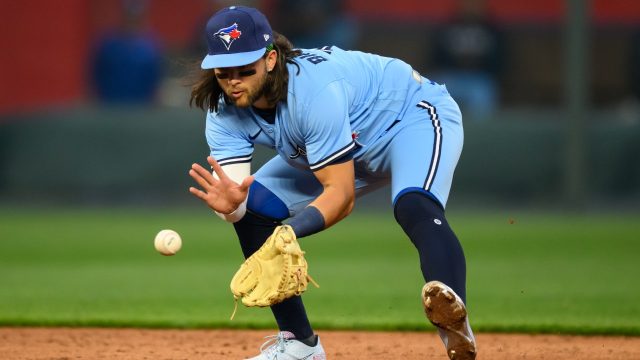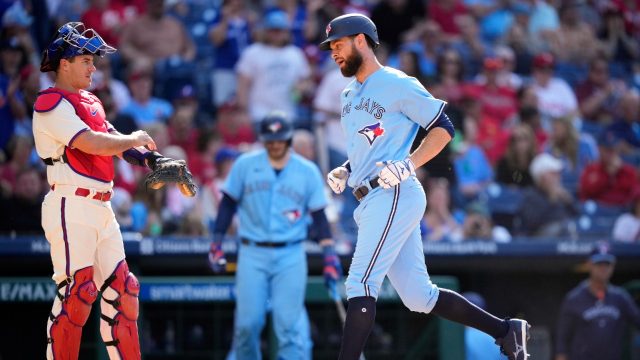
MIAMI – On Oct. 1, when they tally up the wins and losses that decide whether the Toronto Blue Jays get to continue playing beyond their 162 scheduled regular season games, there won’t be a third category labelled “context.”
There won’t be consideration given to the fact the Blue Jays began a game Wednesday only 10 minutes past noon and 15 hours after their prior one concluded. That the team was playing its ninth and final game of a three-city, two-time-zone road trip, amidst a stretch of 40 games in 42 days, won’t factor in. The many players grinding through minor injuries, the catcher on the IL, the star shortstop scratched a half hour prior to first pitch, the suboptimal necessity of a four-man rotation and the consequently beleaguered bullpen — little of it will even be remembered.
All that will matter is whether the Blue Jays could find a way to scratch one more digit into their overall win total on a humid Wednesday afternoon in Miami. And that’s exactly what they did, leaning on languishing Marlins starter Sandy Alcantara for five runs in a bat-around second inning and doing just enough to keep a plucky Marlins offence at bay in a 6-3 victory that won the club its first series in its last four played.
Only a year ago, as he was churning his way through complete-game efforts on the way to a unanimous Cy Young award, Alcantara would’ve been a nightmare matchup for a scuffling offence. But things change in a hurry at baseball’s highest level, and Alcantara has been a shell of his once-imposing self in 2023.
He’s running an ERA nearly three runs higher than last season’s; his strikeout and walk rates have trended in the wrong directions; one of MLB’s best changeups (-25 run value in 2022) has become eminently hittable (.345 wOBA against in 2023). Blue Jays fans who watched Alek Manoah go from Cy Young candidate to minor-leaguer in a span of months can certainly relate.
But the Blue Jays themselves weren’t in Miami to empathize — they were there to take advantage. And as Alcantara repeatedly left fastballs and sliders up over the place in Wednesday’s second inning, the Blue Jays passed the baton from hitter to hitter down their lineup.
Matt Chapman and Cavan Biggio doubled with authority; Santiago Espinal and Kevin Kiermaier singled; George Springer and Whit Merrifield found shallow outfield grass. Ultimately, the Blue Jays batted around in the second inning and plated five runs. It was only the second time the club has scored more than three in its last eight games.
But the Blue Jays squandered subsequent opportunities to continue adding on against a shaky Alcantara, as Merrifield lined into a 6-4 double play with two runners on and one out in the fourth, before Espinal grounded out on a full-count heater at the end of a nine-pitch battle with two runners on and two out in the fifth.
After erasing a Tyler Heineman walk in the sixth by getting Springer to ground into a first-pitch double play, Alcantara was back on the mound in the seventh — a remarkable sight for anyone who’d seen how things went for him in the second. And he retired the Blue Jays in order on nine pitches.
So, there’s some good and some bad in that. The good: Toronto stringing together hits in the second and scoring multiple runs in an inning for only the fifth time in the club’s last eight games. The bad: a quick reversion to the brief at-bats and missed opportunities that have plagued this offence for weeks. And the fact the Blue Jays have hit only one home run — Chapman took Marlins reliever Steven Okert deep in the eighth — over their last four games.
Remember Toronto’s 20-run outburst against the Tampa Bay Rays? That was nearly a month ago. Over their 26 games following leading into Wednesday’s matinee, the Blue Jays were held to three runs or fewer 17 times. They averaged only 3.62 runs per game — the third-lowest run production rate across MLB:
Fewest runs per game from May 24 – June 20
|
Team |
Runs per game |
|
Oakland A’s |
3.36 |
|
Kansas City Royals |
3.39 |
|
Toronto Blue Jays |
3.62 |
|
St. Louis Cardinals |
3.67 |
|
Pittsburgh Pirates |
3.75 |
Any list including the Athletics, Royals, Cardinals, and Pirates is generally not one a team wants to be on. But such is the extent of Toronto’s difficulties generating runs with an offence that is otherwise performing among MLB’s best.
The Blue Jays have been a top-10 club in terms of batting average, on-base percentage, walk-to-strikeout rate, barrel rate, and weighted runs created plus. They began Wednesday second across MLB in baseball’s most fundamental offensive statistic: hits. It just wasn’t translating into the one category that decides whether or not you win games.
Toronto’s lineup did receive a boost Wednesday, as Brandon Belt returned after a minimum stay on the 10-day injured list due to a hamstring issue. Belt had posted a 1.009 OPS over his last 30 games prior to the injury and was leading MLB with a .464 on-base percentage over that span. That the Blue Jays activated the 35-year-old as soon as they could rather than leveraging Thursday’s off-day to steal him a bit more recovery time tells you something about how desperate the club is for an offensive spark.
But the benefit of Belt’s return was immediately counterbalanced by Bo Bichette being scratched 30 minutes prior to Wednesday’s game with left thumb soreness. Bichette began experiencing the discomfort during Tuesday’s game and called time during his first plate appearance to shake out his left hand.
Bichette wasn’t sent for X-rays and the club’s hope is that the issue will clear up after an off-day on Thursday. Wednesday was Bichette’s first missed game this season and only his seventh since the beginning of 2021.
Meanwhile, Blue Jays starter Kevin Gausman wasn’t exactly his best, but pitched well enough to keep a contact-oriented Marlins club at bay and went into the seventh inning for the ninth time in 16 starts. Averaging over six innings per outing, Gausman now trails only Nathan Eovaldi, Framber Valdez and Gerrit Cole in total innings this season and has taken over the AL lead in pitcher fWAR.
Gausman’s stuff didn’t lack velocity or movement, yet was less effective at generating swing-and-miss than it typically is. He pounded the bottom third of the zone with fastballs and splitters, as usual. But the Marlins demonstrated their strong collective bat-to-ball skill, fouling off 23 pitches on the afternoon while whiffing only nine times.
Gausman hit a rough patch in the fourth, as Bryan De La Cruz ambushed a first-pitch slider for a leadoff knock before Jesus Sanchez and Garrett Cooper followed up with back-to-back well-struck doubles, plating a pair of runs. He eventually got out of it, but not before throwing 23 pitches in the inning.
And yet, it took the same amount of pitches for Gausman to face the minimum while breezing through the fifth and sixth. But he opened the seventh single, hit by pitch, single to the Nos. 7, 8, and 9 hitters, which allowed another run to cross and ended his day.
With the oft-inevitable Luis Arraez due up, Blue Jays manager John Schneider called on Erik Swanson, who required only two pitches to get MLB’s hit leader to ground a well-located splitter into a double play. A brief Jorge Soler battle later, Swanson got the second groundball he needed to suffocate the rally.
Trevor Richards, back in the bullpen after a brief stage as Toronto’s defacto fifth starter, worked a clean eighth before turning things over to Jordan Romano, who worked around a single and walk to record his MLB-leading 22nd save.






